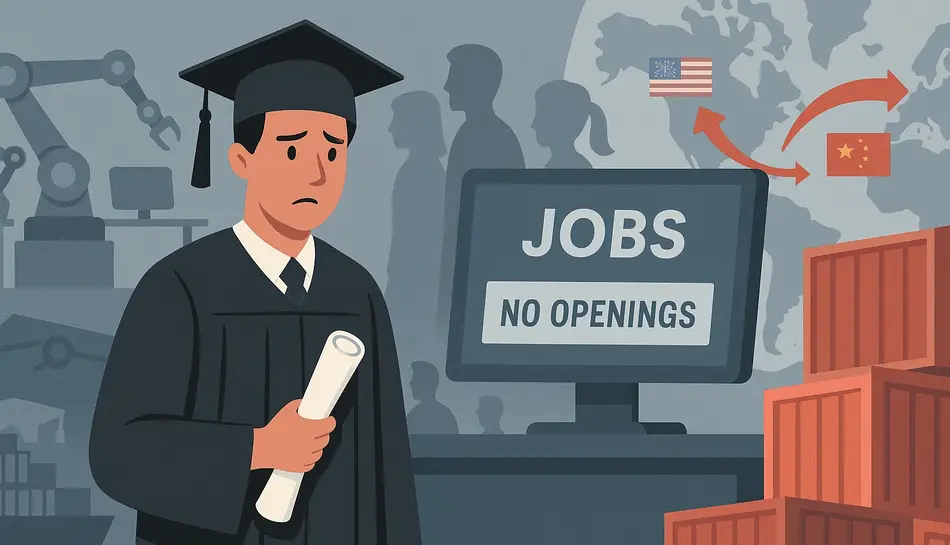Graduate Job Market Crisis of 2025 is hitting new graduates hard. The Class of 2025 is entering what many economists call the toughest job market in decades. AI is replacing entry-level work, global trade tensions are slowing hiring, and the lingering effects of the pandemic continue to reshape careers before they even begin.
A Generation Struggling to Enter the Workforce
Caitlyn, a recent university graduate, applied to 647 jobs before landing a role. Many others haven’t been so lucky. “Nobody will even give me an interview,” she says, echoing the frustration of an entire cohort.
The numbers back this up. The three-month moving average unemployment rate for new graduates sits at 5.3% — well above the national average of 4.2%. It’s the first time in U.S. history that graduates are more likely to be unemployed than the general workforce.
The story is global:
- Australia: Graduate job postings fall year after year.
- UK: Toughest graduate job market since 2018; half of graduates considered “unemployable.”
- China: Youth unemployment peaked at 17%.
- U.S.: MBA graduates from top schools like Stanford and Wharton are struggling to land work.
Why Are Graduate Jobs Disappearing?
The crisis can be traced to three main factors:
1. AI Is Taking Entry-Level Jobs
For decades, technology created as many jobs as it destroyed. But artificial intelligence is different. It’s the first tool capable of general cognitive labor — automating writing, coding, research, and analysis.
- Goldman Sachs once predicted AI could eliminate 300 million jobs worldwide. Two years later, evidence is mounting.
- Anthropic’s CEO Dario Amodei warns that AI could wipe out half of all entry-level white-collar jobs in the next five years.
- Even creative industries like writing, graphic design, and publishing are seeing disruption.
Take Andrew Cole, a YouTube writer who lost his job when his employer began using AI trained on his own scripts. He turned to book publishing, only to find AI authors flooding Amazon. “I can’t compete with this,” he said in a now-viral video.
This isn’t an isolated story. Tech firms are skipping junior hires altogether, preferring AI-assisted mid-level workers.
Find Graduate Opportunities in a Tough Market
Search WhatJobs for entry-level and graduate roles—even as AI and trade tensions reshape the job market in 2025.
Search Graduate Jobs →2. Trade and Tariff Uncertainty Freezes Hiring
Geopolitical uncertainty is also weighing on hiring. With U.S. tariffs and global trade disputes, companies are taking a “low hiring but low firing” approach.
- Deutsche Bank economist Brett Ryan calls it an “employment freeze.”
- Harvard economist David Deming explains: “Young workers are seen as investment like capital, and in uncertain times, investments are the first thing a business cuts back on.”
Even industries traditionally friendly to graduates, such as nonprofits and government agencies, are cutting back due to cost pressures.
3. The Post-Pandemic Job Market Slowdown
Remote work briefly offered hope for graduates by broadening opportunities. But in 2025, remote roles account for just 20% of listings on LinkedIn — yet they receive 60% of all applications.
Meanwhile, the “Great Resignation” is over. Workers are quitting less, clinging to job security. That clogs the career ladder, leaving fewer entry-level spots to fill.
Graduate Job Market Crisis of 2025: Ghost Jobs and Rising Frustration
To make matters worse, job seekers are often applying to “ghost jobs” — postings for roles that companies have no intention of filling.
A Quartz survey found that 60% of companies admit to posting fake openings, either to gather candidate data, boost employee morale, or simply make it look like they’re expanding.
For graduates already disillusioned, this adds another layer of distrust.

Is College Still Worth It?
University used to be the surest path to career stability. But that promise is eroding:
- Only 22% of U.S. adults believe a degree is worth the cost.
- The “college wage premium” is shrinking across the U.S., UK, and Canada.
- In China, the oversupply of graduates has left many turning to fake companies where unemployed youth “pretend to work” to save face.
Meanwhile, Gen Z enrollment in U.S. colleges is dropping sharply, as more turn to trades and blue-collar work that AI can’t replicate.
Where Are the Opportunities Now?
While AI looms over white-collar work, some fields remain relatively safe:
- Trades and skilled labor: plumbing, electrical work, construction.
- Healthcare: nurses, care workers, therapists.
- Education and engineering: though not immune to burnout or disruption, still relatively stable.
- Entrepreneurship: Young people (18–24) are now the fastest-growing group of entrepreneurs in the U.S.
Even AI critics like Geoffrey Hinton, the “Godfather of AI,” advises: “It’s going to be a long time before machines can do physical manipulation as well as humans. A good bet would be to be a plumber.”
Looking Ahead: Adaptation or Collapse?
The graduate job market is in an “adjustment period.” Some argue AI’s hype may plateau, just like the dot-com bubble, leading to a temporary slowdown before the next wave of innovation. Others believe AI disruption will only accelerate.
Either way, graduates still have one advantage: time. With adaptability, creative side hustles, and AI-assisted entrepreneurship, many can carve their own path rather than waiting for traditional career ladders to reopen.
FAQs: Graduate Jobs in 2025
1. Why are new graduates struggling more than other workers?
Because entry-level roles — the traditional first rung of the career ladder — are exactly the kind of jobs AI and automation replace first. Add economic uncertainty, and companies are reluctant to invest in inexperienced hires.
2. Is college still worth it in 2025?
It depends. Certain degrees (engineering, healthcare, skilled trades) still provide strong returns, but general liberal arts degrees face diminishing job prospects. The wage premium for graduates is shrinking.
3. What careers are safest from AI?
Hands-on, physical, and human-focused jobs: trades (plumbers, electricians), healthcare, teaching, and fields requiring in-person expertise.
4. How long will this graduate employment crisis last?
Analysts suggest it could persist for several years as AI adoption accelerates and global trade remains unstable. However, a slowdown in AI’s progress could create temporary relief.




